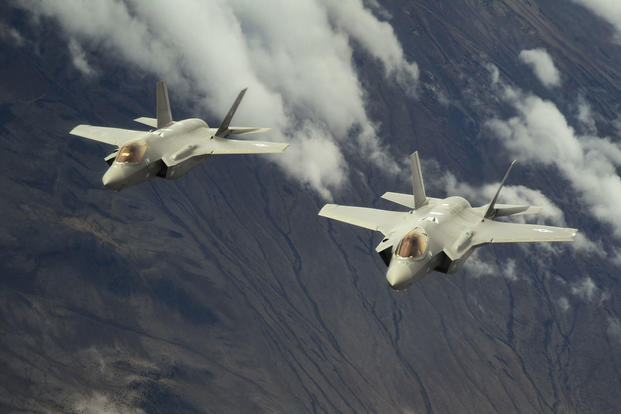Congress is offering the Defense Department the option to purchase Turkey's F-35 Joint Strike Fighters and giving the defense secretary discretion to spend up to $30 million to store the fifth-generation jets until a plan for their use is formalized, according to the final version of the National Defense Authorization Act for fiscal 2020.
Defense Secretary Mark Esper has been given the green light to spend funds "to be appropriated for fiscal year 2020 for the Department of Defense to conduct activities associated with storage, preservation, and developing a plan for the final disposition of such F-35 aircraft and Turkish F-35 aircraft equipment, including full mission simulators, helmet-mounted display systems, air system maintenance trainers, and ancillary mission equipment," the bill states.
That money would fund storage for up to six jets and associated materials. F-35 deliveries to Turkey had originally been slated to occur between late summer and the end of this year.
Lawmakers will not allow the F-35As once destined for Turkey to be transferred unless that country gets rid of its S-400 surface-to-air-missile systems and associated equipment and promises never to purchase or use the Russian-made weapon again, according to the bill.
Related: Ousting Turkey from F-35 Program Will Cost US Hundreds of Millions, Officials Say
"Turkey's possession of the S-400 air and missile defense system adversely affects the national security of Turkey, the United States, and all members of the North Atlantic Treaty Alliance," lawmakers said.
In a joint statement provided with the bill Tuesday, Congress said it would "support" the U.S. purchase of all jets originally meant for Turkey. The aircraft have been stationed at Luke Air Force Base, Arizona, where international pilot training is conducted.
"The conferees also encourage the Secretary of Defense to maximize the procurement quantity of Turkish F-35A aircraft associated with Lots 12, 13, or 14 during fiscal year 2020 using the additional funds authorized in section 4101 of this Act," according to the statement.
Esper has 90 days from the bill's passage to provide congressional defense committees a report outlining a long-term plan for Turkey's F-35s, "which includes options for recovery of costs from Turkey and for unilateral use of such assets," the bill states.
Despite months of efforts to sway the NATO ally from purchasing the S-400, known to Moscow as the "F-35 killer," Pentagon officials have been steadily phasing Turkey out of the JSF program.
The Pentagon in July officially booted Turkey from participating in the program over its purchase of the Russian-made S-400 and asked students -- pilots and maintainers -- attending F-35 training in the U.S. at Luke and at Eglin Air Force Base, Florida, to leave.
The DoD also began phasing out aircraft parts manufactured by Turkey. Turkish industries produce 937 parts for the F-35, including items for the landing gear and fuselage.
"We're on the path to March 2020 to transition all of those parts out. ... The U.S. absorbed about a $600 million bill for that," Under Secretary of Defense for Acquisition and Sustainment Ellen Lord said in October.
Lord at the time said top brass estimates that Turkey's surface-to-air missile systems will be ready to track aircraft in the region by the end of 2019.
-- Oriana Pawlyk can be reached at oriana.pawlyk@military.com. Follow her on Twitter at @Oriana0214.
Read more: Here's How US Space Force Will Be Built












